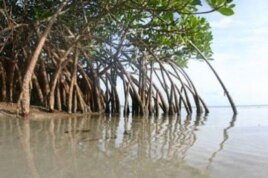14 July, 2016
Water, the saying goes, will find its way.
And so it seems to be the case in West Africa. Rising sea levels and erosion along the coast are threatening the homes and jobs of hundreds of thousands of people across West Africa.
Grand-Lahou is one example. The Ivory Coast tourist town is about 100 kilometers west of Abidjan. The waves are swallowing the coastline of Grand-Lahou's old town at a rate of one to two meters a year.
It is a problem along much of West Africa's coast. The effects could be serious. One-third of the area's people live by the sea. The coastal areas contribute about half of the area's GDP, or gross domestic product.
Eugene Koffi has spent all his life on a shrinking patch of land between the sea and lagoon. It is called Lahou-Kpanda.
Pointing out across the water, Koffi says the sea used to be back there, two kilometers away. But now, it comes up to just a few meters away from where he stands. He says there used to be people living there, and coconut trees.
But now, many houses have been abandoned along the coast. Residents moved inland.
Coastal erosion is not new. It is a natural event. But experts say human activity is speeding up the process. With global warming, the sea levels are rising around the world.
Grand-Lahou has been hurt by nearby government dams and the practice of taking sand to build houses. Many buildings from the early 20th century have washed away.
Water has eroded the fence around the church. It regularly fills the courtyard. And at the cemetery, the tombstones are slowly being covered by sand.
For the few thousand fishermen there, making a living has become harder. One says the mouth of the river is stuck in the sand, and they cannot cross with their boats.
Barthelemy Bamba is the director of the Center for Ocean Research in Abidjan. They work on prevention and awareness issues. They also advise the Ivorian government on developing future structures like coastal roads.

Conservationists say Cameroon is losing about 2,500 hectares of mangroves each year. The resulting erosion and loss of habitat for wildlife also threatens the jobs of up to five million people who live along the coast. (Cameroon Mangrove Network)
He says there were mangroves—a kind of tree—that grow in the salt water of the lagoon. The problem starts when the river mouth is closed, blocking the salt water. The lagoon becomes fresh water and the mangroves die. But the mangroves are very important for biodiversity—keeping different kinds of life in the area.
If the mangroves die, Bamba says, it basically ends fishing there. The fishermen say the government could help by removing the sand from the mouth of the river.
But experts say the rising sea level is irreversible—there is no way to turn it back. In the end, the people will be pushed inland, too.
I'm Anne Ball.
Emilie Iob reported on this story for VOANews. Anne Ball adapted this story for Learning English. Hai Do was the editor.
We want to hear from you. Write to us in the Comments Section below, and find us on our facebook page.
________________________________________________________________
Words in This Story
lagoon – n. an area of sea water that is separated from the ocean by a reef or sandbar
erode – v. to gradually destroy something by natural forces
cemetery – n. a place where dead people are buried
tombstone – n. a marker for where a person is buried, usually made of stone